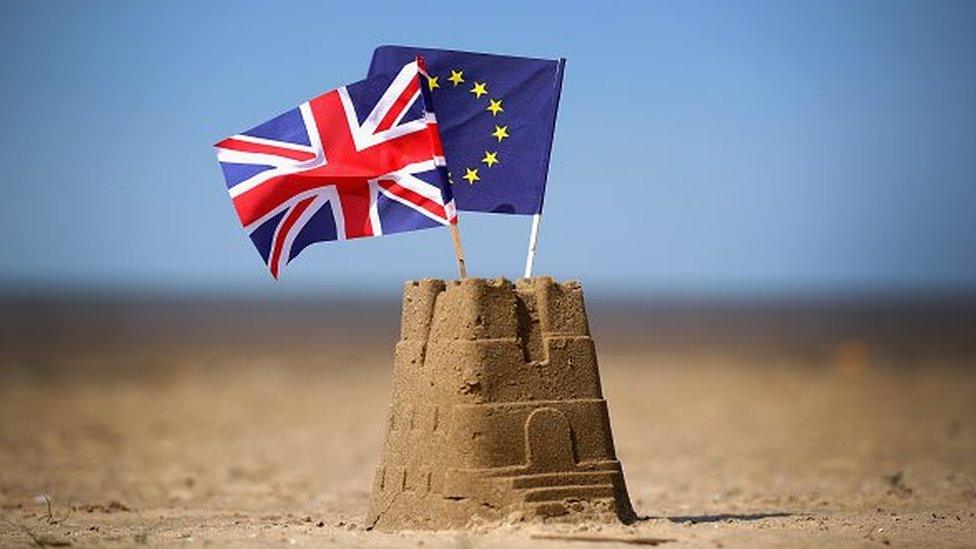Brexit forecasts can be wrong, it doesn't mean they are pointless
- Published
- comments

When I asked Christine Lagarde about the fact that the International Monetary Fund had been wrong in the past about its forecasts for the British economy, she gave a disarming response.
"Yes, on occasion we have been wrong," the managing director said earlier this month.
Forecasts are just that, after all - forecasts.
But, she continued, when it comes to the possibility of Britain leaving the European Union, "We can't see anything that is positive."
It is a similar story today with the Treasury's "short-term" economic impact report on what government economists believe would be the effect on the economy if voters plumped for Leave on 23 June.
Yes, forecasts can be wrong, but, using well-tested economic models, it is the Treasury's analysis that the downsides far outweigh any benefits.
And, to be accurate, this is actually a "gap analysis", rather than a forecast - that is, it is a judgement on the difference in economic activity between two comparable scenarios (Remain and Leave).
Such gap studies are widely viewed by economists to be at the more robust end of modelling tolerances.
The model used is known as a vector auto-regression, which has been used here to look at the effect of "uncertainty" on issues such as business investment and household borrowing on economic performance.
That is then allied to a "gravity model", which judges the trading relationship between nations and the effect those relationships have on growth.
The more uncertainty there is and the more barriers that are thrown up to free trade, the more negative the impact, the model suggests.
The government believes that the UK would not be able to gain better access to the EU if it were outside the union and more specifically, the single market.
It also says that uncertainty would fundamentally undermine investment.
In that assessment, it finds allies in the IMF, the Bank of England, the London School of Economics and the National Institute of Economic and Social Research.
It should be pointed out that all use similar models, or indeed the same model, to test the figures.
The Leave campaign is quite right to point out that models can be wrong, as they were ahead of the UK's expulsion from the exchange rate mechanism.
Then, the models suggested that growth would collapse, unemployment would rise and inflation would spike.
In the event, the UK economy did suffer a shock, but it wasn't of the calamitous variety.
It was of the "shot in the arm" variety - Britain is a relatively deregulated and open economy - and marked the start of nearly two decades of uninterrupted growth.
Campaigners for Leave believe the same could be true of leaving the EU, which would, according to supportive economists, mean cheaper food and manufactured goods, to give one example.
That's because Britain would be outside what Prof Patrick Minford, of Cardiff University, describes as the "customs union" - the tariffs the EU imposes on goods coming into the single market.
Better free trade agreements could also be signed, Prof Minford believes, with countries which are becoming more and more important for British exports, such as the US and China.
There are many genuine economic disagreements between Remain and Leave, often based on legitimate points of view held by serious economists.
Certainly, the weight of economic opinion as expressed by leading organisations, as I have said before, is in favour of Remain.
And Prof Sir Charles Bean, the former deputy governor of the Bank of England, describes today's Treasury's document as "reasonable".
Sometimes this debate can feel a little like "my plague of frogs is worse than your plague of frogs".
And we could all be forgiven for becoming a little fed up with politicians shouting at each other, particularly when they claim, as the prime minister did today, that "this is what happens" to the economy, without a nod to "coulds" or "maybes".
These are forecasts, not definitive outcomes.
But, political hubris to one side, today's Treasury analysis can be set apart from the "he said, she said" tenor of much of the EU referendum debate.
It is based on a well understood and tested economic model.
It might be wrong, or the outcomes might be substantially different once real events take hold - as is true of all forecasts - but it is very much worth the paper it is written on.